Time has come for our weekly Twin Peaks: The Return review and recap, and I swear, these reviews are the one thing that make my Sundays worthwhile. Today’s episode will be rich in nearly all kinds of moods. There will be laughs, there will be tears, there will be gloom, there will be absurdity, and yes—there will be blood. All in all, this episode shines more through its diversity in character delivery and emotions than relevance in the plot. Then again, we have a more solid feel for the objective and its perils. So one may see this as something of a ‘breather’ episode.
The festival of friendship
Remember when we used to think the Mitchums were a menace? When the aftermath of Cooper’s uncanny stint at the casino spelled a prospect of doom at their hands? Rodney looked steely cold and even Bradley flaunted an uncharacteristically stoic facet of a traditionally comedy-oriented Jim Belushi. Yeah, good luck thinking back on those days with a straight face now. The start of this episode is the ultimate confirmation that once you enter the strange world of joy and purity that is Cooper’s current life, it will rub off on you.
The sight of the Mitchums, their girls, and Cooper gleefully conga-lining about Bushnell’s offices is something to behold. Particularly so for Anthony Sinclair, who happens to be the orchestrating party behind the latest attempt on ‘Dougie Jones’ assassination. He is basically witnessing a grand backfire.
In a show of gratitude for the 30 million check, the Mitchums brought pricey gifts to Bushnell, which include keys to a fancy new car. This moment is unabashedly absurd and delightfully tone-breaking for the overall feel of The Return. It’s through these little jewels that some say David Lynch is a painter who makes films (again), making this parade a wayward, rebellious color in his constant chiaroscuro.
However, back to the narrative, the Mitchums’ latest decision spells a change of direction. Going by Duncan Todd’s instructions, it falls to Anthony himself to kill ‘Dougie’. He has one day to accomplish this. Now, we know Anthony is a slime ball and an asset to very dangerous people. Also not a particularly nice fellow. But is he a killer? More on that a bit later.

For now, let the wholesomeness run its course a little longer. We’ll need these feel-good moments for what’s to come. The Mitchum Brothers’ courtesy extends to Cooper’s household as they also bought him a brand new car. And more importantly, a jungle gym set for Sonny Jim. Janey-E’ s joy is a dear sight, especially considering her character on her first appearance, which wasn’t gratuitous, as the actual Dougie left a lot to be desired in nearly every way.
Now, for all she knows, ‘Dougie’ is bringing wonders left and right. Even if mostly through intervention by the Black Lodge, it seems that Dale Cooper is good for your health and overall state of being. He may not be imparting his kindness and wisdom as he used to, but he’s instinctively resonating with these ‘good vibes’, if you will.
Now, allow me to make a little a bit of a digression. Sonny Jim is a very important character, even if he doesn’t show up that often. In a series that has observed the dangers that prey upon the youth, plain innocence and good instincts are golden. Since The Return has taken a far darker approach than the original seasons, a child who has brought Cooper to tears just by existing is a shimmer of innocence amidst the chaos. But when compared to the fates that have befallen others, his presence is a constant bitter reminder that innocence, once lost, is irretrievable. A way to express this in style is with Current 93 (a band that would fit beautifully in the Roadhouse’s roster) and their song: “The Bloodbells Chime.”
The Grim Reaper
On the other hand, there are those who care little for innocence, and in fact, would callously destroy it. The Coopelganger, Mr. C, has caught up with Ray at a building in Western Montana, and he’ll want some payback for shooting him. However, Ray and his gang (that happens to feature child murderer and lady molester Richard Horne) have the numbers and house advantage. Then again, while Ray would much rather kill him immediately, there are rules to be followed. If Bad Coop succeeds in beating the leader, Renzo (Derek Mears) at arm wrestling, he’ll become the new boss. Otherwise, they’ll recruit Coopelganger and kill him if he misbehaves. Mr. C isn’t interested in becoming the new boss, but he’ll have Ray if he wins.
Goes without saying, nobody there thinks he’ll win. Alas, he does, because he’s not a human being and that’s the least of it with this sinister fella. But he doesn’t just win, he coldly toys with the much more muscular Renzo, drawing the tension further for Ray, whose life hangs on the outcome of this competition. To top it off, he also punches Renzo’s face in after winning. Since rules are rules, Evil Coop gets Ray and cellphones.
The unfortunate victim’s interrogation is chilling to see. He confirms that someone called Phillip Jeffries tasked him to kill Mr. C. The motive? There is something inside Coopelganger that ‘they’ want. Possibly a golden orb, similar to Dougie Jones’ ‘final form’ upon returning to the Black Lodge.
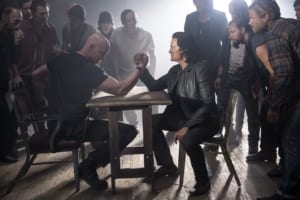
Ray shows him a small object, which he was supposed to put on Coopelganger after he killed him. Evil C is ominously interested in who gave that to Ray; it was someone dressed as a guard, whom Ray has never seen before. As Mr. C tells him to put in on, we see just what it is: an owl ring. Moreover, he still wants the coordinates Ray got from Bill Hastings’ secretary. Although Ray draws a line here—showing utter disdain for the idea because he knows who Coopelganger really is—he still gives him the information, written on a piece of paper. Dick Horne seems strangely interested in this as he watches the interrogation through a screen, along with the rest of the gang.
The final question: Where is Phillip Jeffries? Ray tells him it’s not a real place, but he’s at “the Dutchman’s.” Evil Coop has all he wants, so he kills Ray. The ring disappears and ends up in the Black Lodge, followed by Ray’s body. MIKE takes the ring, as usual. By the looks of things, the Big Bad will be coming back to town. He might just be the fire Margaret warned Hawk about when she called him a few episodes ago. The prospect of all the horror to possibly ensue is harrowing. All the while, the real Cooper is far away and seemingly unaware of the alarmingly high stakes.
The dirt
Speaking of Cooper, his finger prints have finally come back from analysis. The Fuscos learn that these prints come from a fugitive, escaped two days ago from a prison in South Dakota. We know this record to belong to his evil, murderous counterpart. And that they also belong to an FBI agent gone missing. We know this latter one to be his real identity.
Naturally, the Fusco detectives dismiss this as a mistake. Seeing the current state of ‘Dougie’, it’s quite understandable that they would dismiss this essential information as rubbish. So they literally dumb it into the rubbish bin. So much for that narrative axis. Alas, business at the Las Vegas police department isn’t over; Anthony Sinclair comes looking for a Detective Clark (John Savage).
Judging by the detective’s reaction to seeing Tony, they are acquaintances with a less than savory history. The matter of the visit is an inquiry on an undetectable poison. Somewhat reluctantly, the dirty detective gives him the desired information: aconitine is his safest bet. But how to obtain it is another matter, which comes at a cost. Tony leaves, with a scheduled meetup later that night to purchase the poison. Interesting to note, several people in the police department are somewhat aware of Tony’s intentions, which spells bleak outcomes for Duncan Todd’s influence, who is but an extension of someone far worse. Meanwhile, another phalanx in Coopelganger’s long hands, Chantal and Hutch, drives through Utah.
The cleaning
The next day, after Janey-E drops Coop at work, Sinclair looks prepared to do the deed. He greets ‘Dougie’ and entices him with coffee. Meanwhile the sight and presumably smell of cherry pie distracts Coop, as you do, Anthony seizes the chance to lethally spike his co-worker’s cup of coffee. While this would have succeeded where other, more murder-oriented, people have failed, his already low willingness continues to deflate further.
The extremely Lynchean mixture of opposing tones and emotions comes into play when Cooper returns to their table. Guided by, of all things, the dandruff on Tony’s shoulders, he starts ‘massaging’ Tony. It’s wonderfully awkward, and you can’t help but imagining what must be going through Anthony’s head.
But his expression gives those thoughts away. He’s experiencing extreme guilt, and it doesn’t take long for his facade to reveal his true colors. No, Anthony Sinclair is not a killer. Though a slimy prick, he has a conscience. Breaking into tears, he discards the tainted coffee, effectively redeeming himself. Without letting the handle slip on the humor for a moment, a fellow restroom user attributes the coffee’s quality to Sinclair crying as he throws the coffee away into a urinal. And to top it off, Anthony apologizes while ‘Dougie’ drinks his coffee and eats cherry pie, completely unaware of the peril that almost claimed his life.
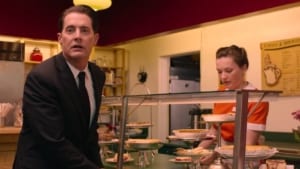
Later that day, Anthony confesses what he had set out to do before Bushnell and Coop. But not only that, he also comes clean about his underhanded deals with Duncan Todd using the company’s resources. The latter is no news for Bushnell as ‘Dougie’ had already unveiled these practices to him via weird patterns on paperwork, courtesy of the Black Lodge. Although Tony’s confession has somewhat quelled the boss’ anger, Bushnell’s chewing out has nearly the same effect as Obi Wan chewing out Anakin in Revenge of the Sith, arguably the best moment of the prequels. Unlike Anakin, though, Anthony is prepared to make amends for what he did.
This means testifying against Duncan Todd. Certainly the right thing to do, but perhaps not the safest. Todd’s circle is bloody and ruthless and they will not look kindly on betrayal. The disclosure reveals the involvement of two cops (one of whom might be Detective Clark), whom Anthony claims are even worse than Todd. Still, Anthony is so invested in atoning that he remarks he would rather die than live with a murder on his hands. So, he gives us the words to pretty much sum up his character’s spirit: change or die. Or, alluding to GORDON COLE’s words in his conversation with Denise, he fixed his heart, now let’s hope he won’t die for it.
The way we were
Meanwhile, it’s a busy day at the Double R Diner in Twin Peaks. Shelly receives a call from her daughter. She is concerned about her husband, who has been away for two days now. As a means of comfort, Shelly invites Becky to the diner to have a treat. Later, that night, Bobby drops by for a quick dinner, and perhaps to see Shelly. He runs into Norma and, guess who, Big Ed, wholesome characters these two. Ed’s gruff but kind demeanor still has its sway, and he convinces Bobby to join them for dinner. When asked about the latest news in the Deputy’s life, Bobby tells them about finding some stuff that belonged to his father that same day. This clarifies the temporal placement of events in the Twin Peaks’ slice of the narrative.
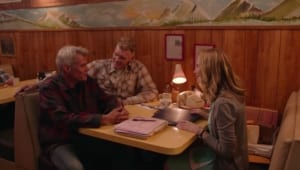
Now, Bobby asks if he’s interrupting anything going on. Big Ed replies, perhaps to the disappointment of many fans of the original series, that there’s nothing going on at all. That’s right, there goes a shovel of dirt on the classic “will they or won’t they?” TV couple. And to pour some salt on the wound, Norma’s partner in both business and romance, Walter (Grant Goodeve) arrives with good news. Norma’s Double R Diner has become a franchise, and numbers are doing real good. That’s lovely to hear. The original ‘flagship’ diner, though, isn’t doing as well in comparison. The dynamic between the two quickly becomes transparent. Walter is the pragmatic business approach in contrast to Norma’s warmer, traditional way.
It’s virtually an expression of a rustic, more honest paradigm of a small community resisting the sway and absorption of an uncaring new world, measured in terms of profit and fads. This generational breach can extend to many perspectives, one of which I would personally outline as a difference in delivery and demeanor in art and media.
One could also read a critique of executive intervention, for which Season 2 was something of a cautionary tale. I will go into further detail on what I mean after The Return’s finale. For now, suffice to say, Twin Peaks may just be one of the more solid and soulful narratives in our current world of streamlined entertainment. But I digress.
Hope and hopelessness
That very same night, Nadine receives a momentous visit at her silent drape runners emporium. It’s Dr. Jacoby paying a visit to his number one fan in the world. Ain’t that a nice gesture? Not only do they acknowledge each other as old acquaintances, she also thanks him and his show for her current position. It appears that his show inspired her to figuratively ‘shovel herself out of the shit’. Considering the state of her character in Season 2, that’s a lot of shit.
Dr. Jacoby confirms this as he addresses the last time he saw her, seven years ago. Much like Norma and her diner, Nadine has thrived, which is nice to see. Unfortunately, we can’t say quite the same for Sarah Palmer.
Just like her first appearance in the The Return, she spends the night watching television and drinking. Although a dreary picture on its own, the constant sound of static sputtering keeps us viewers on our toes, considering static and electrical currents as motifs linking the mundane world to the uncanny otherside. The aforementioned sound is the first hint of an oddity, but the looping of both the boxing match and Sarah’s behavior in this suitably drawn out scene spells it out—something is terribly wrong in this house. Sarah appears completely unaware of it all throughout, whether by influence of some outside force, or possibly worse, her no longer caring.
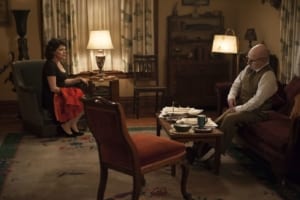
The pervading feeling of wrongness extends to Audrey and Charlie’s place, where they argue once more. Last episode, it seemed as if Audrey had grown into an emotionally abusive spouse, but this conversation doesn’t speak too highly about her husband either. Not only has he shown little interest in telling her the details of his phone call with Tina last episode, he’s also quick to dismiss Audrey’s current emotional state. She doesn’t feel like she’s truly herself or that she can leave the house at all.
Whether it’s an emotional disorder or something else, it doesn’t help that Charlie is basically holding leverage over her by threatening to “end her story.” Audrey breaks into tears at being in this crossroads of confusion. The questions keep piling up about these two, and one in particular comes to mind.
Could her mental and emotional state be wounded by the ever increasing likelihood that Cooper’s doppelganger raped her? If so, Richard’s birth would have only exacerbated this trauma.
This episode comes to an end with something of a piss take. The last time a performer was properly introduced, it was a high profile artist Nine Inch Nails. What other artist could attribute a proper introduction of the sort? Well… James Hurley, of course. Now, Mark Frost and David Lynch are absolutely not Benioff and Weiss; they are not oblivious to the rough edges of their characters, or the audience’s reception to them. It’s also not like them to force a character down our throats in an attempt to convince us they’re great. Hence the hilarious “James was always cool” comment in the first episode of The Return.
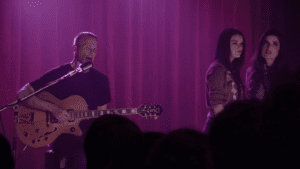
Now that the nostalgia factor has been quenched, our Twin Peaks‘ starved brains will inevitably lead to one conclusion. No, James was never cool.
Since he is a local artist, it makes sense that he would get a warm reception from the crowd. But the fact that it’s a way better reaction than what NIN got makes the joke even funnier. And it doesn’t stop there, oh no. He’s singing the infamous “Just you” from Season 2, which involved Maddy Ferguson as the only redeeming factor. The song also doesn’t sound any better than it did over twenty years ago.
The crowd is quite into it, though. Especially Renee, who is moved to tears. The utter, flagrant exaggeration is followed by a scene that crushes the effect of James’ hilarious performance. It’s Big Ed, alone at his petrol station. As he burns a small piece of paper, his expression says nothing but sheer misery.
Time hasn’t been as kind on some, since last we saw them. Hopes and dreams can sometimes materialize just as much as they can crumble as the years pass by. We may share the same sentiment, as our hopes for this revival have been majestically materialized, but they make soon break our hearts as we reach the final episodes. Now that more parties have an eye on Major Briggs’ coordinates in Twin Peaks, the pace will most likely accelerate to its climax. This will probably be no ground for jokes or exaggeration, only sheer dread and terror.
All images are courtesy of Showtime
Twin Peaks: The Return – Part 13 Credits
Directed by David Lynch
Written by Mark Frost and David Lynch

